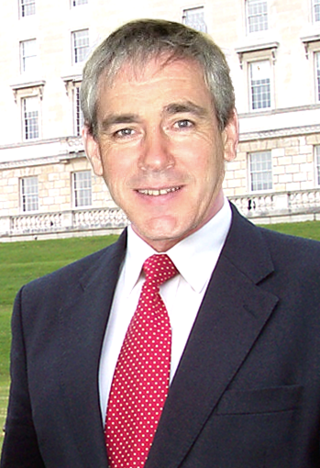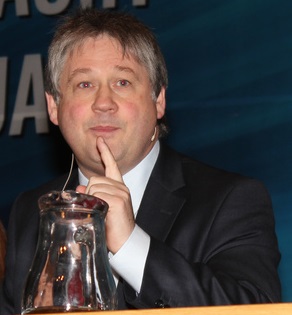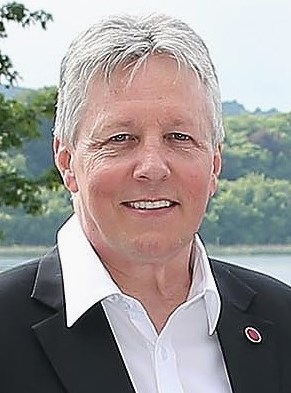| ||||||||||||||||
| ||||||||||||||||
| ||||||||||||||||
An election for the leadership of the Ulster Unionist Party (UUP) was held on 22 September 2010. [1]
| ||||||||||||||||
| ||||||||||||||||
| ||||||||||||||||
An election for the leadership of the Ulster Unionist Party (UUP) was held on 22 September 2010. [1]
Following poor results in the 2005 general election, the UUP held a leadership election, in which Reg Empey was successful. Empey formed an electoral coalition with the Conservative Party, but the UUP's only MP resigned from the party, and the coalition won no seats in the 2010 general election. Following the election, some party members urged him to remain leader but, on 15 May, Empey announced that he would resign in time for an election to be completed by the party's annual conference, in October or November. [2] On 9 August 2010, it was announced that Empey would resign on 22 September 2010 and that the election would be held the same day. Nominations are due by 31 August 2010. [3]
In May 2010, BBC News named five potential candidates for the leadership: Tom Elliott, Danny Kennedy, Basil McCrea, Michael McGimpsey and David McNarry. [4]
Kennedy reportedly ruled himself out on 14 June 2010. [5] Elliott announced on 22 June 2010 he would stand in the election, stating that he had a "vision for a progressive party". He was flanked by Kennedy, McNarry and McGimpsey when he announced, as well as by Mike Nesbitt and Assembly Chief Whip Fred Cobain. [6] McCrea officially announced his intention to stand on 23 August 2010. [7]
One of the most prominent issues in the leadership choice was relations with the other major unionist party, the Democratic Unionist Party. While Kennedy repeatedly called for a pact or an alliance with the DUP, McCrea was strongly against it, claiming that such an alliance would only increase voter support for SF in the republican camp. [8]
Elliott stated on 25 August 2010 that he was also opposed to a single Unionist party [9] and that he would seek to reform the electoral link with the Conservative Party in order that candidates would stand as UUP and not Ulster Conservatives and Unionists - New Force. [10]
| Candidate | Total | ||
|---|---|---|---|
| Votes | % | ||
| Tom Elliot | 643 | 68.6 | |
| Basil McCrea | 294 | 31.4 | |
| Total | 937 | 100 | |

The Ulster Unionist Party (UUP) is a unionist political party in Northern Ireland. The party was founded as the Ulster Unionist Council in 1905, emerging from the Irish Unionist Alliance in Ulster. Under Edward Carson, it led unionist opposition to the Irish Home Rule movement. Following the partition of Ireland, it was the governing party of Northern Ireland between 1921 and 1972. It was supported by most unionist voters throughout the conflict known as the Troubles, during which time it was often referred to as the Official Unionist Party (OUP).

Sylvia Eileen, Lady Hermon is a retired Unionist politician from Northern Ireland. She served as the Member of Parliament (MP) for the constituency of North Down from 2001 to 2019.

Belfast South was a parliamentary constituency in the United Kingdom House of Commons.

Reginald Norman Morgan Empey, Baron Empey,, best known as Reg Empey, is a Northern Irish politician who served as the acting First Minister of Northern Ireland in 2001. He was the leader of the Ulster Unionist Party (UUP) from 2005 to 2010 and served as chairman of the party from 2012 to 2019. Empey was a Member of the Northern Ireland Assembly (MLA) for East Belfast from 1998 to 2011.

The 2005 Ulster Unionist Party leadership election began on 7 May 2005 when David Trimble resigned as leader of the Ulster Unionist Party following his party's poor performance in the 2005 general election when it lost all but one of its seats, including Trimble's own. Following his resignation, the UUP's executive committee charged Sir Reg Empey, Lady Hermon and Lord Rogan with the interim leadership of the Party.

Major Robert Alan McFarland is a former Northern Irish unionist politician who was a Member of the Legislative Assembly (MLA) for North Down from 1998 to 2011.

Thomas Beatty Elliott, Baron Elliott of Ballinamallard, is a Northern Irish unionist politician and farmer. He was the leader of the Ulster Unionist Party (UUP) from 2010 to 2012, and was a member of the Northern Ireland Assembly for Fermanagh and South Tyrone from 2022 until 2024, having previously served from 2003 to 2015. Elliott was Member of Parliament (MP) for Fermanagh and South Tyrone from 2015 to 2017 and was appointed to the House of Lords in 2024.

Michael McGimpsey is a former Ulster Unionist Party (UUP) politician who was a Member of the Northern Ireland Assembly (MLA) for Belfast South from 1998 to 2016.
Independent Unionist has been a label sometimes used by candidates in elections in the United Kingdom, indicating a support for British unionism.

David McNarry is a former Northern Irish unionist politician and Ulster Loyalist representative who served as a Member of the Legislative Assembly (MLA) for Strangford from 2003 to 2016.

John McCallister is a former Northern Irish Unionist politician who was a Member of the Legislative Assembly (MLA) for South Down from 2007 to 2016.
Robert David Stewart Campbell, CBE, usually known as David Campbell, is a Northern Irish unionist politician, Ulster Loyalist activist, farmer and businessman. He was a member of the 1996–1998 Northern Ireland Forum, and Chairman of the Ulster Unionist Party from 2005 to 2012.
The Northern Ireland Conservatives is a section of the United Kingdom's Conservative Party that operates in Northern Ireland. The Conservatives are the only major British party to field candidates within Northern Ireland and typically contests only a fraction of seats in elections. The party won 0.03% of the vote in the 2022 Northern Ireland Assembly election and 0.1% of the vote in the 2024 United Kingdom General election in Northern Ireland.

Basil McCrea is a former Northern Irish politician. He was the party leader of NI21 from 2013 until it disbanded in 2016. He was also a Member of the Northern Ireland Assembly (MLA) for Lagan Valley from 2007 to 2016.

The 2016 Northern Ireland Assembly election was held on Thursday, 5 May 2016. It was the fifth election to take place since the devolved assembly was established in 1998. 1,281,595 individuals were registered to vote in the election. Turnout in the 2016 Assembly election was 703,744 (54.9%), a decline of less than one percentage point from the previous Assembly Election in 2011, but down 15 percentage points from the first election to the Assembly held in 1998.
The fourth Northern Ireland Assembly was the unicameral devolved legislature of Northern Ireland following the 2011 assembly election on 5 May 2011. This iteration of the elected Assembly convened for the first time on 12 May 2011 in Parliament Buildings in Stormont, and ran for a full term.

The 2010 United Kingdom general election in Northern Ireland occurred on 6 May 2010 and all 18 seats in Northern Ireland were contested. 1,169,184 people were eligible to vote, up 29,191 from the 2005 general election. 57.99% of eligible voters turned out, down 5.5 percentage points from the last general election.
The election for the leadership of the Ulster Unionist Party (UUP) was held on 31 March 2012. The UUP holds an election for the office of Leader each year at its Annual General Meeting, which is normally returns the incumbent unopposed. The contested election was triggered after incumbent Leader Tom Elliott, elected in 2010, unexpectedly announced on 8 March 2012 that he would not be seeking re-election. Nominations closed on 16 March 2012.

A by-election for the UK House of Commons constituency of Mid Ulster in Northern Ireland was held on 7 March 2013. The election was triggered by the resignation of Martin McGuinness, who had been elected to the seat in 1997 as the Sinn Féin candidate. The election was won by Francie Molloy, also of Sinn Féin.
The Loyalist Communities Council (LCC) is a British Unionist and Loyalist organisation in Northern Ireland.